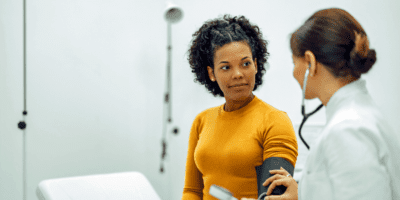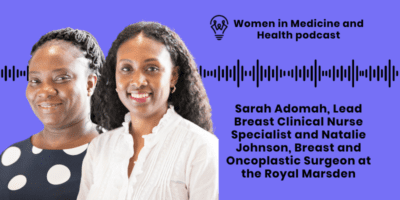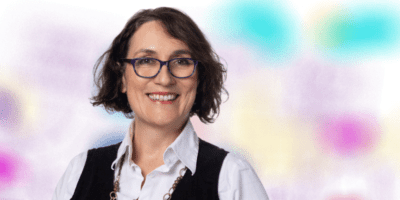Dr Claire Dewsnap is president of the British Association for Sexual Health and HIV (BASHH), as well as being a consultant physician in genitourinary medicine at Sheffield Teaching Hospitals NHS Foundation Trust. She studied medicine at the University of Sheffield before commencing a training post at Chelsea and Westminster, which she completed in Sheffield. Claire was appointed as a consultant in 2007 in Sheffield and became clinical lead in 2009 and she is a passionate advocate for careers in genitourinary medicine.
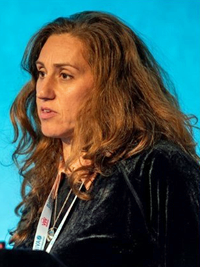
“Diversity of thought in medicine and healthcare is absolutely critical. My main worry is that in medicine in particular medics don’t represent the people that they care for. It’s really critical that you understand the challenges in people’s lives.”
Overcoming perceptions
My educational background is that I grew up in a working-class area of Manchester and I went to a secondary school. At school I really struggled to be recognised as somebody who might be able to do medicine, and I REALLY wanted to do medicine, so I had to work quite hard to overcome some of those perceptions about what I was and wasn’t capable of.
I had to work twice as hard, I think, as lots of my peers and I got good enough grades at A-Level and I went on to study medicine at the University of Sheffield. Once I’d finished my undergraduate training, I moved around doing what’s now called Core Medical Training. I then came across genitourinary medicine as a career. Just after I’d finished my Royal College of Physicians core training, and that was the point at which I became a speciality trainee.
I did my specialty training at the Chelsea and Westminster in London initially, and then when I had just over a year left of my training, I transferred my number to Sheffield, completed my specialty training and then became a consultant. Initially I was a consultant at Rotherham and Sheffield, now I’m solely Sheffield-based, having been here since 2012. Pretty much since the beginning of my being a consultant, I’ve been a clinical lead, apart from the odd short spell here and there.
Championing sexual health care
My job is great. Most of my job is seeing people in sexual health clinics. I’m a genitourinary medicine (GUM) consultant, so I mainly deal with HIV, sexually transmitted diseases, post-exposure prophylaxis for HIV and pre-exposure prophylaxis for HIV. Most days I’m either in clinics with my own patients or I’m in clinic as a senior doctor reviewing other people’s patients.
I have one HIV specialist clinic a week. I also spend a lot of time in meetings because I’m a clinical lead, so in addition to that, I’ll be going to operational meetings to overview how the service runs. I go to commissioning meetings to talk to them about how we look at sexual health in the city as a strategy, so examining what the local service delivers.
I also go to many multidisciplinary team specialist meetings to make decisions about treatment and management of patients. I also get involved in lots of governance, so I go to governance meeting to make sure that we’re doing all the right things, making sure audits are being done correctly, making sure that we’re hitting all our markers around safety and quality.
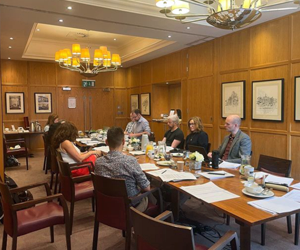
In addition to that, I’m president of The British Association of Sexual Health and HIV (BASHH). I’ve been the president since the beginning of this year, 2022, and so on a lot of days I will have national meetings with various organisations, so this morning I had a meeting with the Department of Health. We have new infection called Monkey Pox, so I’ve spent a lot of time going to Monkey Pox meetings with both the UK Health Security Agency and NHS England.
I also have many meetings with the BASHH board so we can make sure we’re developing a strategy, because the organisation is ultimately a charity so we have to make sure that we’re meeting our aims and objectives.
The evolution of the field of sexual health
It used to be that if you worked in a genitourinary medicine (GUM) clinic you were a GUM consultant or a specialist nurse in GUM. And then in the community you would have lots of people who were specialist nurses in the area of contraception and in particular, often senior people who were community gynaecologists, or what we now call CSRH (community sexual and reproductive health) consultants.
So those are people who’ve trained, especially in contraception and reproductive sexual health, so that’s much more from a gynaecological perspective, the whole range of women’s health. The GUM service is very much more based around infection and management of infection.
Over the past ten years what has happened is that many services have been integrated where both contraception and the complex needs of people with contraception and sexually transmitted infections, including the prevention of HIV and the management of HIV, are managed under one roof, so there’s still a lot that’s evolving — changes in practices and service developments — that are happening around that.
In addition to this, GUM as a training programme is also trying to get itself more involved in general medicine because we’re all trained through the Royal College of Physicians, as opposed to CSRH consultants, who have a different set of competences and outcomes, so as services, we are trying to deliver a more integrated way but obviously there’s challenges for that, as we see in a lot of public health services at the moment.
How technology is influencing sexual health education and access to information
In terms of education, there is a lot happening around digital social digital media. So BASHH itself has now got a social digital media partner who does all our messaging around what’s good health. Our focus is less about “Oh, don’t do this” and it’s more about positive sexual health messages, so what are the things that can allow you to have positive sexual health experiences and good sexual health overall? This is happening across the sector, both from NHS organisations, charities like BASHH and the British HIV Association (otherwise known as BHIVA).
It’s also from the voluntary sector, so the Terrance Higgins Trust, Brook and lots of others like National Aids Trust, so there’s lots of social digital media used to get messages out both to professionals but also to potential service users. So that’s one bit, and I think that’s generally very positive and really helpful.
There is also development of testing and treatment online, and this is a bit more of a complicated area in terms of what’s cost-effective and what’s good quality. So, there are a number of providers that do very high-quality online testing kits. So that’s where you go online, you ask for test, it comes to your house, you do the test at home, you send it back, and then you get a result.
That’s often great quality, but there is still some element of some people being restricted access because of course you have to be IT literate, you have to be able to speak English as a first language, or certainly read it. You also have to have money on your phone so that you can go on, or you have to have access to a computer and Wi-Fi.
It’s not yet proven that absolutely addresses issues with inequitable access, but it pushes the boundaries a bit further forward, but then there is a whole complicated area of private providers providing some services, some of which BASHH would say are in inappropriate services, and then charging people huge amounts for them, and also charging people to get antibiotics.
Now, obviously as GUM clinicians we’re really concerned about antibiotic use that isn’t well registered or correctly legislated for because of the dangers of driving antibiotic resistance, which we know is becoming a worse problem. Gonorrhoea, one of our major infections, is now beginning to develop resistance to the only antibiotic left that’s able to treat it. So, there are concerns about how online platforms can ethically and appropriately use the tests and treatments that are now available to people online in a way that they weren’t 10 or 15 years ago.
At BASHH we are doing everything we can to drive quality and safety. We have a few big pieces of work, both working with private providers, but also with voluntary sector organisations to make sure that the quality and the standards that are delivered are appropriate.
Importance of diversity of thought in medicine and healthcare
Diversity of thought in medicine and healthcare is absolutely critical. My main worry is that in medicine in particular medics don’t represent the people that they care for. It’s really critical that you understand the challenges in people’s lives.
As a doctor, it’s quite easy to think that if people don’t adhere to therapy or they don’t come to their appointments is because they’re not interested, but for the vast majority of people it’s actually that there are too many obstacles to access the healthcare that you are providing. It’s been well evidenced generally that the best teams are teams that have a lot of challenge, appropriate challenge, but also different perspectives that can address the different perspectives that reflect the people that use our services.
We don’t really have as much challenge in medicine as much as we need to as there are still a lot of blocks for people from working-class backgrounds getting access to careers in medicine. Widening participation is being addressed, but we need to do more. I think in a fairly unambitious way — so there’s still very few people who have access to medicine as a course at university who come from ordinary backgrounds as opposed to having received a private education.
There’s a statistic that something like between 60% and 65% of people who get a place at medical school are people who previously went to a private school for their primary and secondary education, and obviously only 6% of people in the general population go to private schools, so there’s a huge inequity there, and I would argue that a lot of people who get to do medicine haven’t really had many of the experiences that our patients will have had.

That’s partly why I really love this specialty, because we tend to be more partnered and understanding where people’s perspectives are, but that doesn’t ever obviously mean to say that it’s perfect. There are always boundaries to be pushed against.
Role models aren’t always hierarchical
I’ve had a couple of people stand out to me in my area. In terms of leadership, I had a clinical lead called Christine Bowman, who was a GUM consultant. She’s retired now but her leadership style is how I try and model myself. Obviously, as you go through any leadership role you evolve, but that was certainly where I started with her. I really respected her advice and I liked the fact that she was non-com combative and was just trying to get the best out of everybody and I really liked that about her.
I was redeployed during COVID and I started to role model some of the younger, in particular female, doctors I worked with. They are people who are probably ten years younger than me, but they have got some different perspectives and different outlooks. I think the idea that role models are all hierarchical is to be challenged because I learn new things from those people. They’re 20 years younger than me but they’re bringing in different things that I didn’t learn when I was at medical school.
I don’t mean medical things, I mean cultures, the way you behave, what you’d expect, how you should put up your own boundaries so that your work-life balance is sustainable. There’s a number of young women that I was really impressive with when I worked with them through COVID and I always remember them when I am trying to deal with difficult situations.
When I’m in a leadership role, I want to be kind and caring, and I’m definitely trying to reflect some of those roles that I’ve seen other people take.
It’s good to talk
I think one of the many things that we need to talk about as a group of women is how trans women are treated. Sexual health has been at the forefront of addressing trans women’s issues, how they identify and how they access services, but it feels to me that if we don’t address this it’s just going to become more and more divisive. I think the only way really to properly explore how we deal with these new times is by talking directly with trans women in particular and people who care for trans women. I think that we have to work together to do that.
I don’t like some of the discourse I see where we take a stance and we’re in a camp. It ultimately won’t get us anywhere and we’re still left with the problem of how do we ensure that all people, however they identify, get equitable care and caring access to services. So, one of the things I would shout out is, please, can we talk about this in a kind way?
Coming up next
At BASHH in particular we have a couple of big things coming up. We are working with some partners to consider what ‘good’ looks like in sexual health services, and that’s going to be a huge piece of consultation work. We’re also refreshing our guidelines in the next 12 months, and again, that will help us drive the quality and care standards for people who are accessing their care online.

I’m also kind of looking towards the future now because the BASHH president role only lasts two years, so I’ll only be in post another year after December, and I’d still be interested in looking at how we drive good policy at the national level for sexual health services as we see the introduction of the new models of integrated care systems (ICSs).
There are going be a lot of ICSs with a lot of pressure for them to focus on things like obesity and cancer, all of which are obviously very important, but sex and good sexual health spans across people’s life courses so it is important to have a positive approach to their own sexual identity and their own sexual health. This should be something that’s embedded in every aspect of integrated care systems. I’m really keen to look at how we make sure that happens on a policy level in the next five to ten years.
A final word about working in sexual health
I would just say that working in sexual health is the best place to work, and if anybody is uncertain about where they want to go next in their career, I would strongly recommend they contact their local sexual health service or the local GUM consultant, or their local CSRH consultant and ask them: “Can I come and spend a few days in your service and see what it’s like?”
I’m proud of the people I work with every day. I’m delighted that I’ve made a small difference to someone’s life, and that can be achieved by being kind and knowledgeable. If you want to work somewhere like that, GUM or sexual health is for you.


